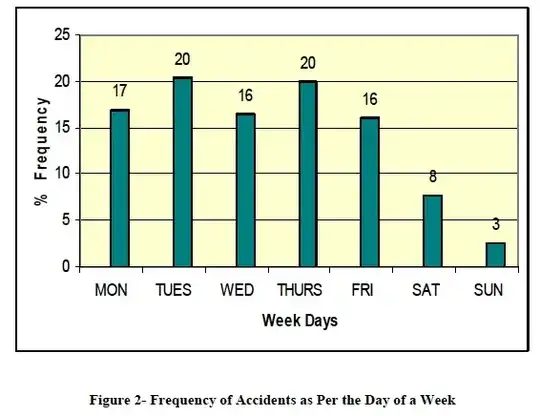While it's obvious, as @Adam Davis points out, that complex products, like cars, are not manufactured in a single day, it may still be of interest when critical parts of the car, such as safety belts, were installed, if Mondays and Fridays are bad days for manufacturing.
Statistics for manufacturing quality per weekday are hard to come by. However, if low quality manufacturing is assumed to be caused by overall lack of concentration (due to still-drunkenness on Monday, or due to thinking about drunkenness on Friday), then I would argue that manufacturing errors leading to workplace accidents should follow a similar pattern as manufacturing errors leading merely to low quality products.
Ruckart and Burgess (2003): Human error and time of occurrence in hazardous material events in mining and manufacturing. Journal of Hazardous Materials, 142:747 who looked at the distribution of accidents reported to the "Hazardous Substances Emergency Events Surveillance (HSEES) system maintained by the Agency for Toxic Substances and Disease Registry (ATSDR)", found that
Most events (2781 [84.7%]) occurred on a weekday, with the greatest number of events occurring during Tuesday through Thursday (619 [18.9%], 565 [17.2%], and 587 [17.9%], respectively).
Which means that on average 17.0% of accidents occur on Mondays or Fridays, respectively.
There is a very similar trend in construction, using data from the Occupational Health and Safety Agency (OHSA), as shown in the Master thesis by Ashwini Bhide from Ohio State University (p. 33). Note that there is no normalization regarding hours worked, and the author states that "It could be due to the obvious reason that the rate of construction activity decreases on the weekends. The high rates (20%) on Tuesdays and Thursdays could not be explained."

In summary, if we can use workplace accidents as indicators of overall concentration levels of workers and consequently manufacturing quality, the data suggest that there is overall little difference between weekdays, with Mondays and Fridays generally being best. How come? It may just turn out that most workers don't get totally wasted on the week-end, but actually relax, and that on Friday, the prospect of relaxing on the week-end makes people happier and thus more motivated to do a good job.
